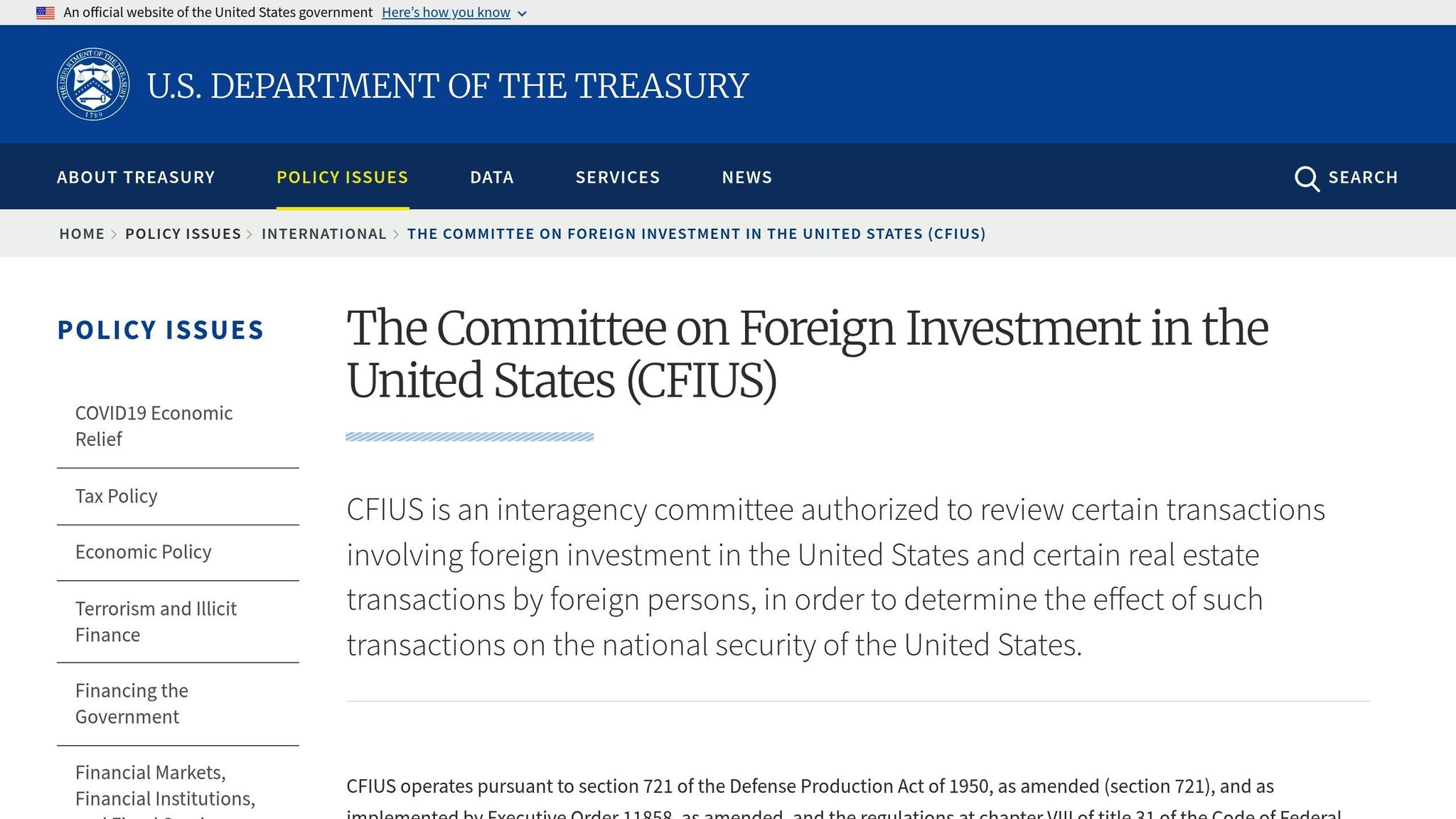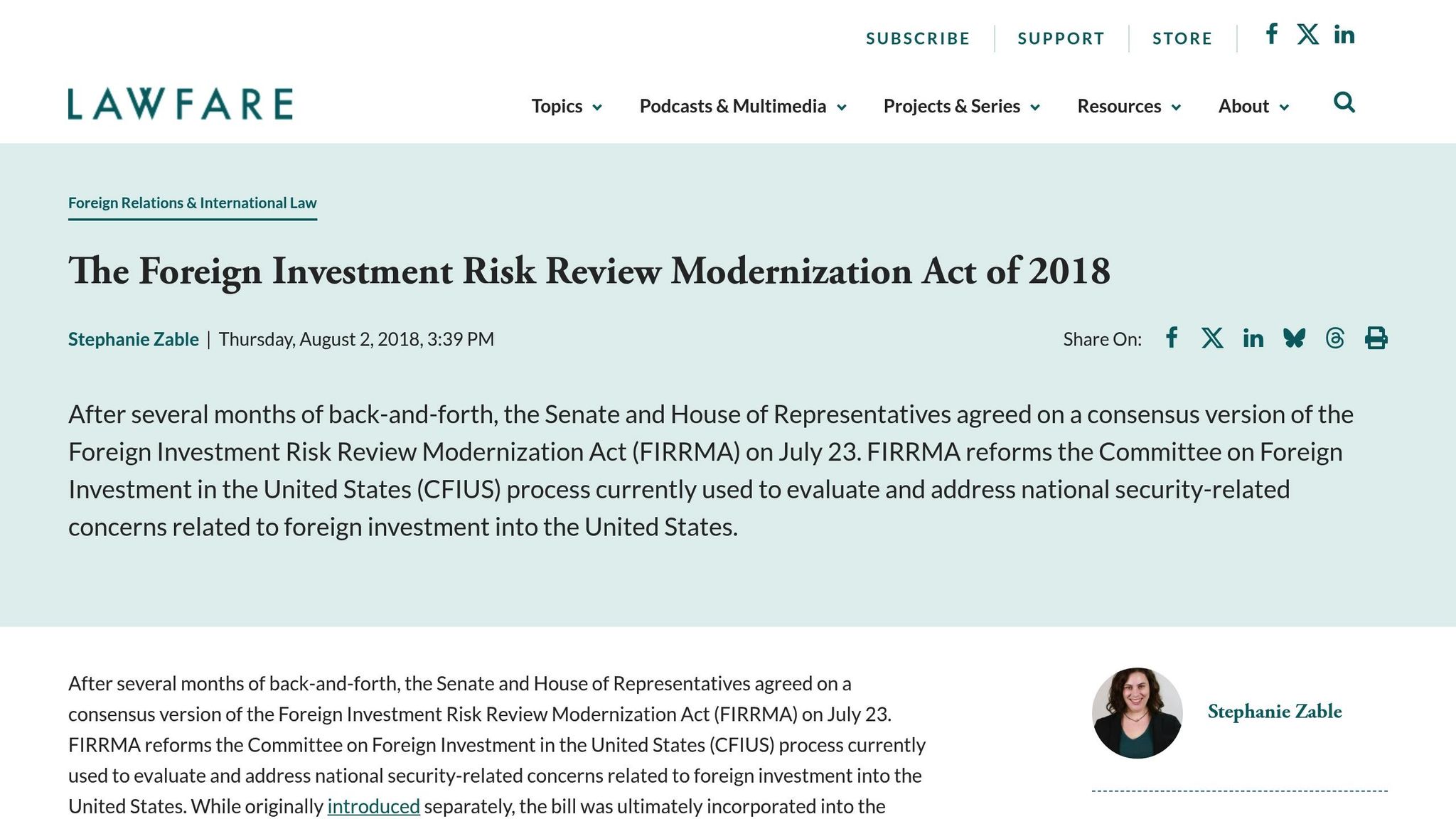Sector-Specific Foreign Investment Rules: Overview

Foreign investment in the U.S. is tightly regulated, especially in sectors critical to national security. These rules, expanded under the Foreign Investment Risk Review Modernization Act (FIRRMA), target industries like technology, critical infrastructure, and agriculture. Even minority stakes can trigger mandatory filings if they involve sensitive data, critical technologies, or infrastructure. Growth-stage companies in these sectors face unique challenges when raising funds or pursuing cross-border deals due to overlapping regulatory requirements.
Key takeaways:
- CFIUS Oversight: Reviews foreign investments for national security risks, including non-controlling stakes.
- Regulated Sectors: Includes semiconductors, AI, telecommunications, energy, and agriculture.
- Compliance Challenges: Multiple agencies and stricter rules complicate transactions.
- Recent Trends: Increased scrutiny of farmland, minority investments, and data security.
Growth-stage companies must prioritize compliance early to avoid delays, penalties, or forced divestments. Expert advisory support can simplify navigating these complex regulations.
Key U.S. Regulatory Bodies and Legal Frameworks
When it comes to navigating U.S. foreign investment oversight, a few key laws and agencies play a pivotal role. At the heart of this process is the Committee on Foreign Investment in the United States (CFIUS), which is tasked with protecting national security. Supporting this effort is the Foreign Investment Risk Review Modernization Act (FIRRMA), which provides the legal framework for modern oversight. Let’s take a closer look at these important entities and their responsibilities.
Committee on Foreign Investment in the United States (CFIUS)

CFIUS is responsible for reviewing foreign investments to ensure they don’t pose risks to U.S. national security. With the introduction of FIRRMA, its authority expanded to cover certain non-controlling investments and real estate transactions - areas that previously might have escaped scrutiny.
Foreign Investment Risk Review Modernization Act (FIRRMA)

FIRRMA introduced mandatory filing requirements for transactions involving foreign governments acquiring significant stakes in U.S. businesses operating in critical sectors, often referred to as TID (Technology, Infrastructure, and Data) businesses. This law ensures a more robust review process to address potential risks tied to foreign involvement in sensitive industries.
Industries Subject to Foreign Investment Restrictions
Foreign investment in the U.S. is closely monitored in industries deemed vital to national security, economic stability, and technological leadership. These restrictions are not applied across the board but are instead focused on sectors where foreign control could pose potential risks to American interests.
Technology and Innovation
The technology sector is under some of the tightest scrutiny, especially in areas involving cutting-edge advancements. This includes semiconductors, artificial intelligence (AI), quantum computing, biotechnology, and advanced manufacturing.
Semiconductors are a key focus due to their essential role in everything from consumer devices to military systems. The U.S. has imposed export controls and strict investment limitations on foreign involvement in semiconductor companies, particularly those working on advanced manufacturing processes or military-specific applications.
Artificial intelligence and machine learning companies also face intense examination, particularly when their work involves facial recognition, autonomous systems, or data analytics with potential surveillance or military uses. Concerns center on foreign access to sensitive training data, algorithms, and AI models that could enhance military or intelligence capabilities. These restrictions play a major role in shaping how U.S. tech companies seek foreign investment.
In biotechnology, companies involved in genetic engineering, pharmaceutical development, and medical devices are closely monitored. The government aims to safeguard advancements in life sciences while preventing foreign access to sensitive health data or critical biological research.
Quantum computing and advanced cryptography firms are another area of concern. Foreign investments in these companies often require mandatory review under the Committee on Foreign Investment in the United States (CFIUS), given the implications for encryption, secure communications, and overall national security. Beyond technology, similar scrutiny extends to other essential sectors.
Critical Infrastructure
Critical infrastructure sectors, which are essential to the nation's functioning, also face rigorous foreign investment restrictions. These include energy systems, telecommunications, transportation networks, water treatment facilities, and financial systems - all of which are vital to U.S. economic and security operations.
Energy infrastructure covers power plants, electrical grids, oil and gas pipelines, and renewable energy projects. Investments in these areas are heavily reviewed to ensure U.S. energy independence and security are not compromised.
Telecommunications networks are under some of the strictest regulations, spanning wireless systems, fiber optic cables, and data centers. The primary concern is foreign access to infrastructure that could enable surveillance or disrupt critical communications.
Transportation infrastructure, including airports, seaports, railways, and logistics networks, is another area of focus. Foreign investments here are scrutinized for risks to supply chains or access to sensitive cargo and passenger data. Maritime ports, in particular, are closely monitored due to their role in trade and military logistics.
Financial infrastructure, such as payment systems, clearinghouses, and financial data processors, is also protected. These restrictions aim to safeguard the stability and security of U.S. financial markets, creating complex compliance requirements for companies in this space.
Agriculture and Farmland
Foreign ownership of agricultural land has become a growing area of concern, particularly when it involves farmland located near military bases, critical infrastructure, or sensitive government facilities.
Recent legislative efforts have increased oversight of agricultural investments, especially those involving foreign government entities or companies tied to foreign governments. Some states have gone beyond federal regulations, outright banning foreign ownership of farmland in certain cases.
Food processing and distribution companies are also under scrutiny, particularly those tied to essential food supply chains or agricultural technologies. The government is focused on preventing foreign control over food security and agricultural advancements, including precision farming methods and genetic modification technologies.
Livestock operations, grain storage facilities, and manufacturers of agricultural equipment may also trigger reviews if their technologies or capabilities impact food security or agricultural competitiveness. Restrictions often extend beyond direct ownership to include long-term leases or management agreements, ensuring foreign entities cannot gain effective control over critical agricultural resources. These measures aim to protect U.S. food security and supply chains, aligning with broader national security priorities.
Compliance Requirements and Regulatory Processes
Compliance processes are the backbone of navigating regulatory frameworks, especially in the context of foreign investments. Meeting these requirements isn’t just a formality - it’s a necessity to avoid serious penalties. As the risk landscape evolves, businesses must establish robust compliance measures early to stay ahead of potential enforcement actions.
Mandatory and Voluntary Filings
The Committee on Foreign Investment in the United States (CFIUS) mandates filings for transactions that hit specific thresholds. Skipping these mandatory declarations can lead to enforcement actions. On the other hand, companies can opt for voluntary notices to secure a "safe harbor", offering additional protection. Knowing the thresholds and understanding the filing requirements are critical steps in meeting compliance obligations.
Compliance Best Practices for Businesses
To navigate the complexities of compliance, businesses should focus on a few key areas:
- Early due diligence: Identify potential risks and address them proactively.
- Proper deal structuring: Ensure the transaction aligns with regulatory expectations.
- Clear documentation: Include all essential transaction details, investor information, and security protocols.
- Regular audits and training: Keep personnel informed and up to date on compliance processes.
These practices not only reduce risks but also help businesses stay aligned with enforcement trends.
Penalties and Enforcement Trends
CFIUS has ramped up enforcement efforts, imposing civil and criminal penalties for non-compliance, such as failing to file mandatory declarations or providing inaccurate information. Consequences can include forced divestments, hefty fines, or even prosecution.
The introduction of the Outbound Investment Rule, effective January 2, 2025, places the responsibility on U.S. investors to self-assess compliance without pre-clearance. Recent amendments from the Treasury have also increased penalties and added stricter information requirements. Additionally, CFIUS has implemented an advanced case management system to improve monitoring and data analysis, enabling more targeted enforcement.
Enforcement decisions are highly case-specific, with regulators evaluating factors like the severity of the violation, intent, and the company’s level of cooperation. For growth-stage companies, these developments highlight the importance of building strong compliance programs from the start. Doing so can help avoid costly penalties and ensure smooth cross-border transactions.
sbb-itb-e766981
Impact on Growth-Stage Companies
Foreign investment regulations can pose significant hurdles for growth-stage companies aiming to expand internationally or attract foreign capital. These businesses often operate in industries that are under strict regulatory scrutiny, making compliance a key aspect of their growth strategies. To scale successfully, companies must grasp how these rules influence deal structures, timelines, and relationships with investors. This creates a backdrop for understanding the challenges tied to cross-border transactions and fundraising.
Cross-Border M&A and Fundraising Considerations
Foreign investment rules, especially those that are sector-specific, add layers of complexity to international transactions. For example, regulatory reviews - like those conducted by CFIUS - can stretch deal timelines. While some reviews are quick, others may lead to extended investigations, creating uncertainty for all parties involved.
The presence of foreign investors further complicates transaction structuring. Growth-stage companies may need to implement carve-outs to limit foreign access to sensitive technologies or data. This approach ensures compliance but often requires additional planning and negotiation.
Investor eligibility rules can also narrow funding options. In some cases, companies must rely more heavily on domestic investors or structure deals to reduce foreign ownership stakes. This is particularly relevant for tech startups working in fields such as artificial intelligence, semiconductors, or cybersecurity, where foreign venture capital or sovereign wealth funds may face restrictions.
Due diligence becomes more rigorous under foreign investment regulations. Companies must provide detailed information during this process, which can prolong negotiations and necessitate specialized legal expertise to navigate the complexities.
Using Advisory Support for Compliance
Given these challenges, expert advisory support plays a critical role in helping companies manage compliance without losing momentum. Specialized advisors can simplify the process of adhering to foreign investment rules while ensuring business objectives remain on track. For instance, firms like Phoenix Strategy Group offer tailored solutions in areas such as transaction structuring, FP&A insights, M&A advisory, and fractional CFO services.
FP&A services are especially useful when compliance impacts deal structures. Sophisticated financial modeling helps companies evaluate different scenarios, assess their effects on valuation, and make informed decisions about investor selection and deal terms.
M&A advisory support is vital for companies navigating acquisitions or preparing for exits in regulated industries. Advisors can pinpoint potential regulatory challenges early, structure transactions to minimize risks, and prepare detailed filings to streamline approval processes.
Fractional CFO services provide ongoing regulatory oversight without the expense of hiring a full-time senior financial executive. These professionals monitor regulatory changes, assess their impact, and implement scalable compliance strategies as the company grows.
Advisory services are increasingly leveraging advanced technology and proprietary data to improve risk assessment and compliance efforts. Automated systems can track regulatory shifts across jurisdictions, alerting companies to new requirements that could affect planned transactions.
Regulatory Trends for 2025
The regulatory landscape is evolving quickly, and several trends are shaping how growth-stage companies approach compliance. One major shift is the expansion of regulated sectors. Regulators are now focusing on areas like biotechnology, quantum computing, and advanced manufacturing, in addition to traditional industries like defense and telecommunications.
Stricter data security requirements are also becoming standard. Companies - especially those in software and technology - must demonstrate strong cybersecurity measures and data governance before gaining regulatory approval. This is particularly important for firms handling sensitive customer or proprietary information.
Another trend involves heightened scrutiny of minority investments. Even small foreign stakes are being examined closely, particularly if they grant board representation or access to proprietary technology. This is prompting growth-stage companies to rethink how they structure early funding rounds.
On a positive note, some regulators are introducing streamlined review processes for specific transaction types. Businesses with strong compliance histories may benefit from faster approvals, making it advantageous to establish robust compliance programs early on.
Cross-border regulatory coordination is also increasing. U.S. authorities are sharing information more frequently with their global counterparts, requiring companies with international operations to adopt consistent compliance strategies across jurisdictions.
Finally, there’s a growing emphasis on self-reporting and proactive compliance. By implementing comprehensive monitoring systems, growth-stage companies can demonstrate their commitment to regulatory standards and national security, positioning themselves more favorably during regulatory reviews.
Conclusion
Navigating the intricate regulatory landscape has become a critical challenge for growth-stage companies, particularly those in sectors like technology, critical infrastructure, and agriculture. Foreign investment rules now touch every phase of cross-border transactions, placing significant compliance burdens on businesses operating in these fields.
Agencies like the Committee on Foreign Investment in the United States (CFIUS) have broadened their oversight dramatically. While their focus once centered on defense and telecommunications, the scope now includes cutting-edge areas like artificial intelligence, quantum computing, and biotechnology. This shift means more companies than ever must factor regulatory requirements into their growth plans.
For businesses in their growth phase, the stakes couldn't be higher. Failing to prepare for these restrictions early can lead to delays in critical deals and reduced access to funding. A forward-thinking approach is not just helpful - it’s essential.
The key to navigating these challenges lies in building a strong compliance framework. Early preparation, coupled with guidance from seasoned advisors, allows companies to address risks head-on. By identifying sectors under the heaviest scrutiny and implementing thorough compliance measures, businesses can align regulatory obligations with their strategic goals.
Looking ahead, the regulatory environment is set to grow even more stringent through 2025 and beyond. Stricter data security protocols, expanded oversight across additional sectors, and closer examination of minority investments are all on the horizon. Companies that lay the groundwork for compliance today will be in a stronger position to seize future opportunities while steering clear of costly missteps.
Expert advice plays a pivotal role in this process. For growth-stage companies in regulated industries, the right guidance can shift compliance from being a hurdle to becoming a strategic asset. Firms like Phoenix Strategy Group (https://phoenixstrategy.group) specialize in helping businesses navigate these complexities, providing the expertise needed to turn regulatory challenges into opportunities for growth.
FAQs
How do foreign investment rules for specific sectors affect growth-stage tech companies in the US?
Foreign investment regulations tailored to specific industries play a crucial role for growth-stage tech companies in the US. These rules aim to protect national security and critical technologies by closely monitoring or limiting foreign investments in areas like artificial intelligence, semiconductors, and cybersecurity.
Although such restrictions can make it harder for startups to secure funding or partnerships from international sources, they also serve to protect innovation and preserve the US's competitive position. For many companies, this opens doors to collaborate with strategic domestic investors who share their long-term vision. Successfully navigating these regulations is key to thriving in the ever-changing investment environment.
How can companies comply with CFIUS regulations and avoid potential penalties?
To meet CFIUS regulations and steer clear of penalties, the first step is figuring out if your transaction falls under CFIUS jurisdiction. This means evaluating whether the deal involves critical technologies, key infrastructure, or sensitive personal data. If it does, you’ll need to file the necessary paperwork with the Treasury Department at least 30 days before closing.
It’s also essential to comply with any conditions or mitigation agreements that CFIUS requires. Ignoring these can lead to hefty fines - sometimes exceeding $250,000. To stay on track, consider scheduling regular compliance audits and seeking guidance from legal or financial experts. These proactive steps can help your company navigate the rules and avoid enforcement headaches.
Why are minority investments in sectors like agriculture and critical infrastructure facing stricter oversight?
Increased Scrutiny on Minority Investments in Sensitive Sectors
Investments in areas like agriculture and critical infrastructure are facing tighter controls due to national security concerns. The U.S. government is prioritizing the protection of sensitive industries and vital resources from potential foreign influence, especially when linked to nations considered adversaries.
One key development is the expanded role of CFIUS (Committee on Foreign Investment in the United States). This committee now plays a bigger part in monitoring investments tied to assets located near military bases, strategic locations, and essential resources like farmland. A notable example is the growing foreign ownership of U.S. agricultural land, which surpassed 40 million acres by 2022. This trend has sparked worries about food security and reliance on foreign entities, leading to stricter regulations aimed at safeguarding U.S. sovereignty.




